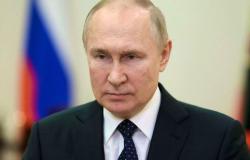The leader of the Parti Québécois did not mince his words. The federal government is “openly and explicitly planning” the decline of Quebec, reported The Press. And this regime “only knows how to crush those who refuse to assimilate.” Paul St-Pierre Plamondon (PSPP) also mentioned “the deportations, the executions and the ban on having education in French” resulting from the “work” of the former Prime Minister of Canada. “Justin Trudeau is in continuity with his father,” he said.
Prime Minister of Canada Justin Trudeau answering questions from the Voix de l’Est journalist. (Stéphane Champagne/La Voix de l’Est)
“Mr. St-Pierre-Plamondon can say what he wants to look for chicanery, reacted Justin Trudeau in an interview with The Voice of the East. To try to raise opinions. I am the member for Papineau. And when I walk around our house, people don’t talk to me about it. I am proud Quebecer and I think people know it. The idea of trying to bring back concepts like that, I think that’s not what we need. And that’s not what Quebecers want either.”
“It’s not someone like him who will make me doubt my commitment to my identity or the legacy of my father, of which Quebecers are still extremely proud,” continued the Liberal leader. Despite some sovereignists who would have liked [que mon père le soit aussi]because Quebec would perhaps be its own country. […] And Quebec is doing very well within Canada.”
Justin Trudeau also believes that holding a third referendum on the sovereignty of Quebec if the PQ is brought to power is far from the population’s priorities. “When I meet people [ici], no one talks to me about this issue. I understand that this is something that still touches certain heartstrings among Quebecers. I don’t want to sink into the “maybe”. I want to spend my time focusing on the challenges that people bring to me every day. […] A referendum on sovereignty does not respond to [aucun] of these issues.”
“We want to be part of the game»
Ottawa is investing nearly $60 million to support projects from IBM Canada and the MiQro Innovation Collaboration Center (C2MI) in Bromont “in order to increase semiconductor production and stimulate economic growth,” he said. -we announced on Friday.
However, does Canada want to position itself as a leading player in semiconductor production or be part of the supply chain for US mega-factories? “One of the great challenges is that we must divide the world between our friends, our allies, and those who would be ready to destabilize us. This is what we are seeing with China and Russia. People are looking for reliable partners, not just at the geopolitical level, but also at the supply chain and economic level. This is why, in terms of critical minerals, electric vehicles or semiconductors, we want to be part of the game»
Canada is already “hugely ahead” in the field of microchips and Quebec is a pillar, underlined Justin Trudeau. “It’s not Toronto, it’s not Montreal, not Vancouver. It is in Bromont that there is the largest installation of packaging for IBM in North America. It’s a real Source of pride for the people here, he said. And the investment [annoncé vendredi] is demonstrating the expertise we have to offer for the niches of the future. Whether it’s quantum or artificial intelligence, it takes new approaches that we are developing here.”
Trudeau remains open to welcoming large producers of electronic chips. However, it is not at the top of the priority list. “We don’t need to make semiconductors from A to Z,” he argued. Perhaps a company will want to do so by investing in Canada. Then, happily [le fédéral] will invest in it. We are looking to ensure these jobs in this ecosystem here. Not just for one flash three years, but for the next 30 to 50 years.”
Grumbling among farmers
Anger is brewing among many farmers across Quebec. This is the case in Montérégie and Estrie. Those who are at the heart of the local people’s pantry are raising the red flag. In particular, they are calling for better support from the state. This includes, among other things, help for the next generation, regulatory relaxations and a review of agricultural financing. Do these demands resonate with the government?
“There are a lot of things we are doing. We are listening. We are looking at the next generation and ensuring food security and support for our farm families in the long term, said Justin Trudeau. There are challenges, we want to help. But above all we want to prepare people to succeed in a world that is changing, even more affected by climate change, by droughts, by floods.
Is the federal government ready to take concrete action quickly to help farmers? “We have all kinds of programs that can help immediately in difficult times,” replied the Prime Minister. But we are always listening.”
Affordable housing
Quebec and Ottawa have promised $1.8 billion for the creation of housing. How does the Trudeau government plan to advocate for the construction of affordable housing?
“We have flexibility in our investments,” said the Prime Minister, referring in particular to a recent program recommending the use of federal public land which will be used for the construction of housing. “Whether it is post offices, military bases or other buildings,” he added, “we are creating opportunities to build low-cost housing with long-term rents. [qui pourraient être construits et gérés par des OBNL].”
Ottawa is open to transforming federal buildings into housing, he indicated in an exclusive interview with La Voix de l’Est on Friday. (Stéphane Champagne/La Voix de l’Est)
Ottawa also advocates “concrete” and “very creative” solutions, he added. In this regard, would the Liberal government be open to converting existing federal buildings into housing? “Absolutely,” said Justin Trudeau. There are challenges. When you think of office towers, there are only one or two washrooms per floor. So it takes some investment in modification. But we are very open to that.”
Arm wrestling with Meta
Several months ago, Ottawa began a standoff with Meta/Facebook over the payment of royalties to the country’s news media. However, Meta maintains the hard line. What Justin Trudeau deplores. “We need quality local journalism. Not wanting to support the democracies that allowed a company like Facebook to exist is an extremely limited and irresponsible philosophy. And we will continue to hold on strong. We hope that Facebook will wake up,” he said, referring to the agreement between Canada and Google, which provides for the Silicone Valley giant to pay $100 million per year to press companies through Canada.
What’s next in the case? “We are working with several other [pays] concerned about the same things, said the Prime Minister. For Facebook to decide that it would rather prevent people from sharing news, rather than pay journalists for the work they do, is not just an attack on community life. This is an attack on democracy.”







